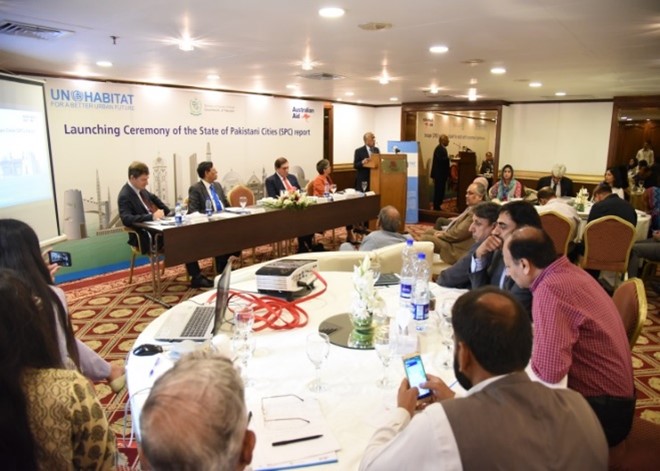State of Pakistani Cities Report (SPCR) (Completed)
 The State of Pakistani Cities report reveals that 54 percent of the total urban population live in ten major cities of Pakistan namely Karachi, Lahore, Faisalabad, Rawalpindi, Gujranwala, Peshawar, Multan, Hyderabad, Islamabad, and Quetta. Cities particularly the large ones have seen enormous urban sprawl due to increase in population and change in land use in down town as well as in the periphery of the cities and are becoming extended part of the cities. As such cities are unable to meet the growing demands of basic infrastructure services and creation of gainful employment opportunities. The challenges therefore, are unplanned urbanization and lack of basic services. Overlapping institutional mandates, lack of infrastructure and fragmented management of municipal and industrial waste. Further, the urban challenges have been accelerated due to effects of climate change such as urban flooding and severe heat waves, affecting human health and urban economy.
The State of Pakistani Cities report reveals that 54 percent of the total urban population live in ten major cities of Pakistan namely Karachi, Lahore, Faisalabad, Rawalpindi, Gujranwala, Peshawar, Multan, Hyderabad, Islamabad, and Quetta. Cities particularly the large ones have seen enormous urban sprawl due to increase in population and change in land use in down town as well as in the periphery of the cities and are becoming extended part of the cities. As such cities are unable to meet the growing demands of basic infrastructure services and creation of gainful employment opportunities. The challenges therefore, are unplanned urbanization and lack of basic services. Overlapping institutional mandates, lack of infrastructure and fragmented management of municipal and industrial waste. Further, the urban challenges have been accelerated due to effects of climate change such as urban flooding and severe heat waves, affecting human health and urban economy.
Pakistani cities vary in terms of their size of economy, employment and tax revenues. Services and industry are the major employment sectors in Pakistani cities. The share of the service economy in the cities is larger than the share of services in the national economy. Pakistan generates 95 percent of its total federal tax revenue from its ten major cities and Karachi contributes 55 percent, Islamabad 16 percent, and Lahore 15 percent. The average urban per capita income in Pakistan among the ten cities varies from PKR 37,000-70,000. Poverty in urban areas is a major and visible phenomenon. Six out of the top ten major cities have double-digit poverty figures: Quetta, with 46 percent has the highest poverty rate while Islamabad, with 3 percent has the lowest poverty rate.
The responsibility for the management of Pakistani cites is divided between Municipalities, District Administration, Development Authorities and Service Delivery Institutions such as, the responsibility for Urban Planning rests with City Development Authorities, while public land ownership is fragmented and divided between Municipality, Development Authorities, Cantonments, Industrial Estates, and Provincial Government departments. The delivery of basic urban services is similarly divided amongst separate authorities. Each agency is autonomous in carrying out the development works and maintaining the facilities within their jurisdiction.
Access to clean water continues to be a major problem in Pakistani cities. Only 65.2 percent of households in Pakistan’s 10 major cities have access to piped water connections. The cities lack sewage treatment facilities and solid waste management which leads to severe environmental pollution and contamination of surface and ground water bodies. Shortage of power supply remains a persistent problem in harnessing the potential of the socio-economic development of the cities. Further, general understanding and appreciation of the environment and heritage is low among the relevant authorities and other stakeholders.
